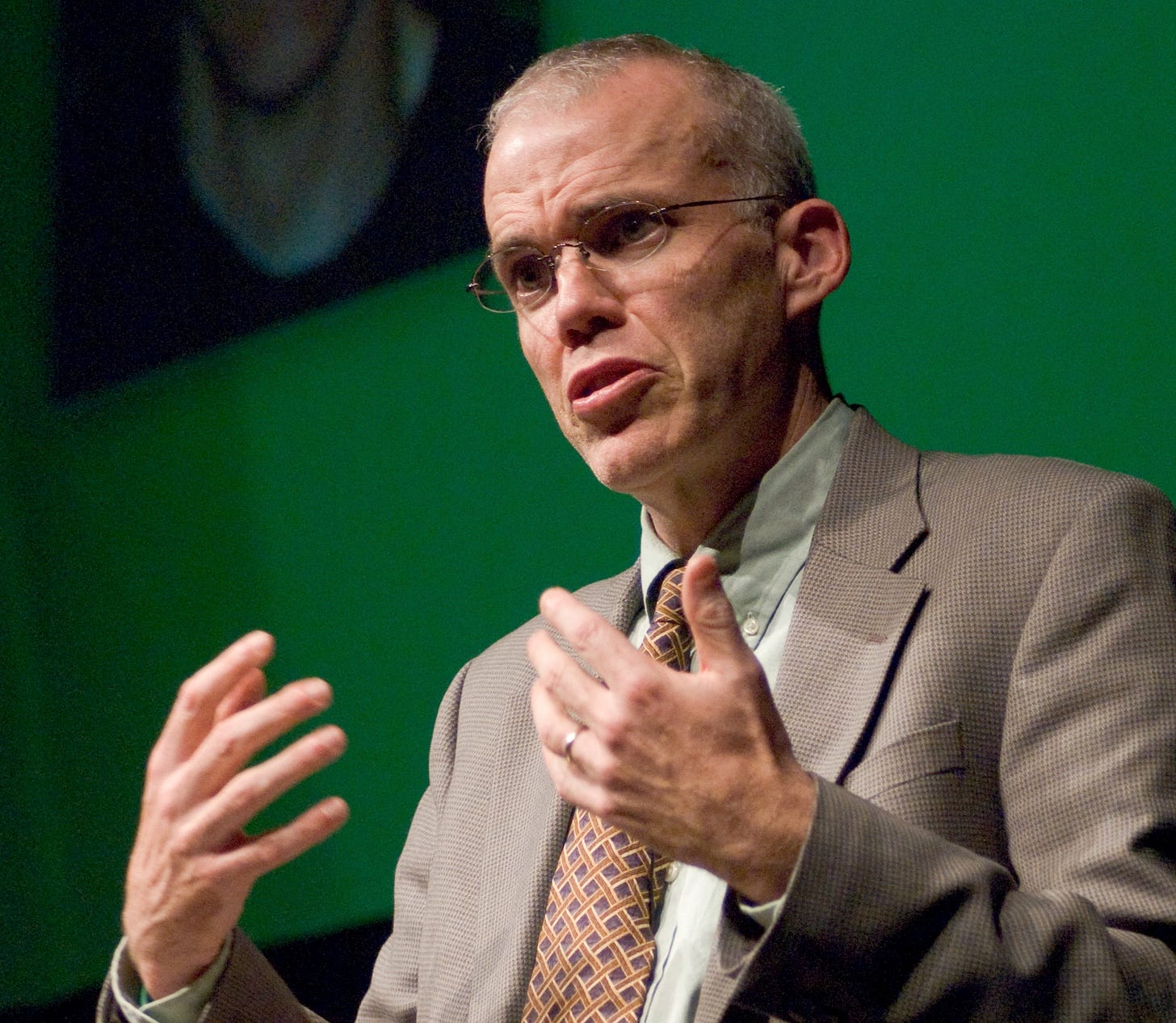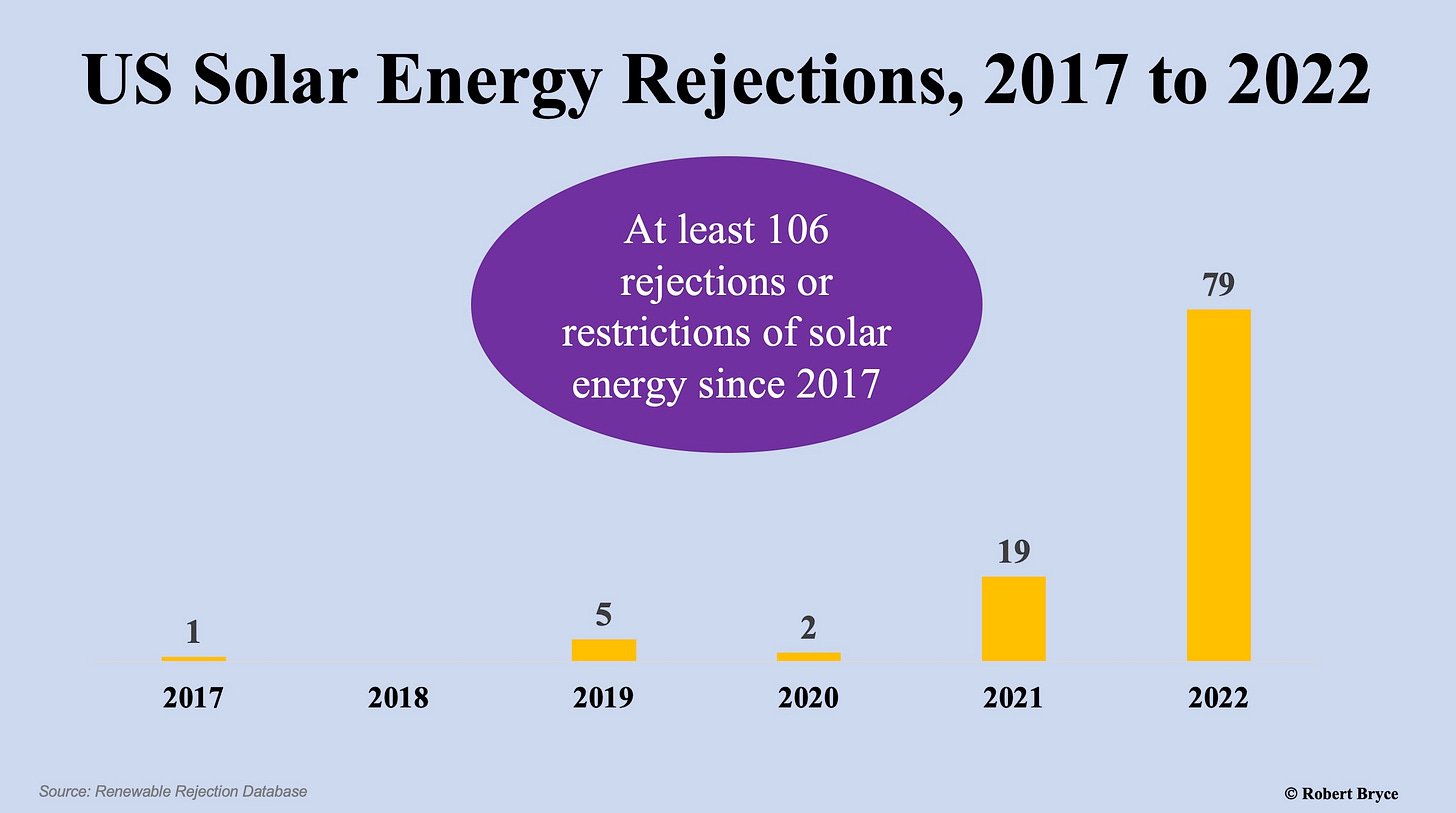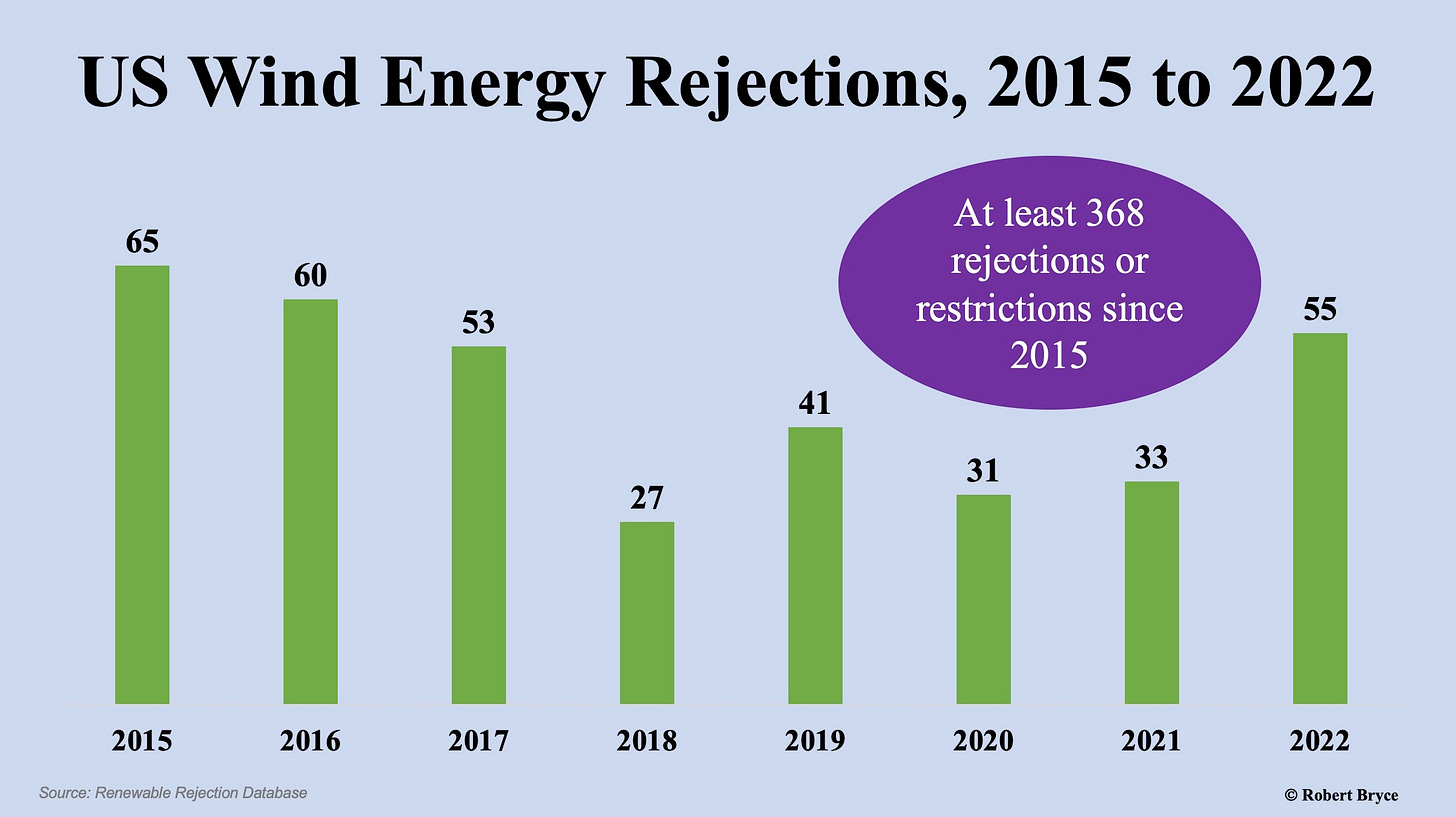Bill McKibben's Dishonest Claims About The Rural Backlash Against Renewables (And Me) In The New Yorker
In which McKibben repeats the fiction that rural Americans are opposing big renewable projects because of “front groups"
I’ve been reporting on the resistance in rural America against the encroachment of large renewable energy projects for a dozen years. For instance, in 2010, I published a piece in the Wall Street Journal in which I wrote about the problem of noise pollution from wind turbines, an issue that the wind industry has denied, and intentionally obscured, for years. That same year, in my fourth book, Power Hungry, I published a chapter on the myth that wind and solar energy are “green.” In Chapter 8, I noted that people living near wind projects in “Texas, Oregon, New York, and Minnesota, as well as in numerous foreign countries, including England, New Zealand, Canada, France, and Australia have complained about the noise [from wind turbines] and cited some of the same problems that Porter named, including sleep deprivation.” I also noted the “vast stretches of land that are needed for the production and transportation of energy from wind and solar installations” and that the “low power density of wind and solar means that they need lots of land.”
In 2015, after writing a number of articles about the rural backlash against renewables, I began compiling data on the communities that have rejected or restricted wind projects in an Excel spreadsheet. That effort eventually became the Renewable Rejection Database, which is available on my website, and contains details on the rejections, which now total 368 for wind and 106 for solar.
I’m one of the only reporters in America covering this beat. I have put a lot of effort into building and updating the Renewable Rejection Database, which is the most comprehensive and authoritative source of information about wind and solar rejections in America. (It will soon be searchable by date, state, and keyword.) What have I learned in my years of interviewing rural Americans and writing about their battles against big renewable projects?
First, large wind and solar projects get built where rich people ain’t. Indeed, as I noted in this 2020 piece in Forbes, the biggest wind projects in New York are being built in some of the poorest counties in the state. Or look at the Osage Wind project which was built by Enel near Fairfax, Oklahoma over the objections of the Osage Tribe. The median household income in that zip code, 74637, is about $34,000, which is a little more than half of the Oklahoma statewide average of about $57,000. Wind and solar projects usually get built in low-income areas for a simple reason: rich people have the money to fight these types of projects. Low-income people generally don’t.
Second, academics from big-name universities, and reporters from big-name media outlets, seldom, if ever, give a thought to the people who live in rural America or consider the reasons why those hayseeds out there in Trump country might object to having forests of 600-foot-high wind turbines and inland oceans of solar projects in their neighborhoods.
I wrote a long piece for Quillette in March about the atrocious reporting done by the Washington Post and National Public Radio about the backlash against wind and solar projects. Julia Simon’s piece for NPR, published on February 15th, which was headlined “In Misinformation Wars, Renewable Energy Is the Latest to Be Attacked,” was particularly awful. Simon claimed that opponents of wind energy are employing “misinformation.” She ignored my years of reporting on the subject and didn’t mention the database even though I talked to her for an hour — at her request — several weeks before her story was published.
Large legacy media outlets won’t cover these conflicts — or rather, they won’t do so fairly — because the backlash against big wind and solar projects doesn’t fit the narrative that solar and wind are “clean” or “green.”
That rather long intro brings me to Bill McKibben’s latest piece in the New Yorker, in which he continues this execrable trend of pro-renewable-energy propaganda masquerading as news. Before going further, a bit of background: I’ve known McKibben for a while. I debated him on the PBS NewsHour many years ago. In addition, I have repeatedly asked him to come on the Power Hungry Podcast. On March 28, I emailed McKibben to invite him to come on the show. He didn’t respond. I emailed again on April 1, April 4, and twice on August 23, (once to his gmail account, and another to his account at Middlebury College) again, no response.
Thus, it was more than a little surprising to get an email from a New Yorker fact checker on the afternoon of December 18 (when I was in the midst of shooting interviews for my new documentary) who demanded that I immediately respond to an article that McKibben had written for the New Yorker that included a mention of me and my work. The fact checker would not send me the text of the article involving me, but would only ask questions over the phone. They included questions about whether I was an “activist” and why I was operating the Renewable Rejection Database. As you might imagine, I was more than a little hot about the line of questioning and on Tuesday, my suspicions were proven correct when McKibben’s piece — which includes a gratuitous smear of me and my work — was published.
The gist of his 6,000-word piece is this: Congress has turned a firehose of federal tax credits — which as I reported in The Hill in August will total some $240 billion by 2031 — on the renewable sector. Thanks to this tsunami of cash, wind and solar capacity should grow quickly so those sources can save us from climate change. But McKibben claims there’s a problem: a right-wing conspiracy (funded by the hydrocarbon industry and, of course, the Koch brothers) is stymieing the growth of renewables by infecting the minds of rural Americans and leading them to oppose big renewable projects in their neighborhoods.
To be clear, this is not a new tactic. The wind industry, through its favorite PR firm, Tigercomm, has been promoting this false claim for years. The wind and solar sectors are spending lavishly to push this narrative in the hope that it will help them build more projects, and in doing so, collect billions of dollars courtesy of federal taxpayers. The dollars involved are huge. The American Clean Power Association, formerly known as the American Wind Energy Association, has an annual budget of $40 million. Another big lobby group, the Solar Energy Industries Association, has an annual budget of about $21 million. SEIA is one of Tigercomm’s clients. So is Apex Clean Energy, which saw its proposed 300-megawatt Honey Creek Wind project go down in flames (it lost by a 3 to 1 margin) last month when the project was put before voters in Crawford County, Ohio.
McKibben is mad that conservative groups like the Austin-based Texas Public Policy Foundation (annual budget: about $26 million) have sued the federal government to stop potential offshore wind development on the East Coast due to the impact it would have on fisheries and the critically endangered North Atlantic Right Whale. He conveniently fails to note that commercial fishing groups and residents of Nantucket have also sued to stop offshore wind development in the whale’s habitat. Nevertheless, he goes on to claim that “the same kind of manufactured opposition is shaping up on land” and that “front groups sponsored by the fossil-fuel industry have begun sponsoring efforts to spread misinformation about wind and solar energy.”
But there’s a problem: McKibben doesn’t provide the name of a single “front group” involved in this nefarious activity. He then quotes Tyler Norris a solar-energy developer working for a firm called Cypress Creek Renewables, as saying “There’s always been some run-of-the-mill nimbyism, that opposes wind and solar projects.”
From there, McKibben’s mendacity goes into overdrive. He quotes Norris, who claimed (again, with no proof) that “there’s an increasingly organized opposition effort, and some of it is Astro-Turf stuff, no doubt.” McKibben continues, saying that Norris, “mentioned Robert Bryce, who was formerly a senior fellow at the Manhattan Institute, which has taken millions of dollars from various Koch entities in the past decade. Bryce is now the custodian of the Renewable Rejection Database, which tracks defeats for clean energy across the country.” The piece then includes a few quotes from me which I gave to the fact checker. (McKibben, apparently, couldn’t be bothered to contact me directly.)
McKibben goes out of his way to smear me. He mentions the Manhattan Institute, even though I haven’t worked there since 2019. McKibben doesn’t mention that I’m the host of the Power Hungry Podcast. (We published episode #154 this week.) No mention of my six books. No mention that I’m the executive producer of a feature-length documentary, Juice: How Electricity Explains the World, which by the way, was screened by the International Atomic Energy Agency at the COP 27 climate meeting in Egypt last month. McKibben works in the Koch money angle because, well, that’s required for any proper smear job if you are a climate activist or alt-energy promoter who’s not getting their way. McKibben seems to think that keeping track of the rejections isn’t kosher because it makes the renewable industry look bad. He doesn’t cite any of the numbers contained in the database, which as can be seen in the graphics above, clearly show a massive surge in rejections this year.
In McKibben’s view, the database — and the people and communities in rural America that it represents — must be ignored because it does not conform to the narrative that any opposition must be due to nefarious bad actors. In his view, the only reason rural Americans are not jumping on his all-renewable bandwagon is due to misinformation being supplied by those unnamed “front groups.”
Yesterday, I contacted Norris to ask him about the quote he gave McKibben. I asked him to name the groups behind the “increasingly organized opposition effort.” Norris did not name a single one. Nor did he provide any examples of the “Astro-Turf stuff” that he claims is being used to stop renewable projects. I also asked Norris if his company was facing opposition to its solar projects and if so, which projects, and where. Norris did not provide any answers. Instead said he was “with family right now” and would “respond more later.” He didn’t.
I pinged him again this morning at 8 am, asking again for examples of front groups, Astro-Turf efforts, and where his company is facing opposition. Norris replied two minutes later, saying he was too busy “dealing with the response to the blackout” which he said, “must take priority over your inquiry.” Norris had plenty of time to denigrate me and my work to McKibben, but amazingly, can’t provide a single example of “front groups” or “Astro-Turf stuff.”
The reason Norris and McKibben can’t name any front groups is obvious: there aren’t any.
Over the past decade, I’ve interviewed dozens of rural landowners, activists, and politicians about their fights against big renewable companies. I have never seen any evidence of front groups. What I have seen, over and over, are people, usually women, working from their kitchen tables, who are spending lots of time and money — their own money — talking to their neighbors and local policymakers, and organizing their communities to protect them from the encroachment of massive solar and wind projects.
I’ve written several articles about the bare-knuckle legal tactics that huge corporations like Invenergy, NextEra Energy, MidAmerican Energy, and Invenergy again, are using against rural communities in their efforts to force those towns and counties to accept renewable energy projects they don’t want. I’ve had guests on the Power Hungry Podcast, including two county supervisors from Madison County, Iowa — Heather Stancil and Diane Fitch — to talk about their opposition to MidAmerican’s proposed wind project in their county. I’ve also had Julie Kuntz on the podcast. She’s a “fifth-generation Iowa farm girl” who has become a leading opponent of wind and solar projects in her home state. Lisa Linowes, the founder and executive director of the WindAction Group, came on the podcast earlier this year to talk about her years-long effort to help inform rural communities about the impacts of big wind and solar installations.
There are many reasons why rural Americans are opposing wind and solar projects. They want to protect productive farmland. They are rightly concerned about their viewsheds and property values. They don’t want to live amid massive wind turbines and look at their red-blinking lights all night, every night, for the rest of their lives. And finally, they are right to be concerned about the annoyance and deleterious health effects that can be caused by prolonged exposure to the low-frequency noise, infrasound, and noise pollution that is generated by giant wind turbines, a problem that was documented way back in 2009 by the Minnesota Department of Health.
A few final points. If McKibben is truly interested in the backlash against renewables, he might have a look around some of the bluest states in America, including his home state of Vermont, where no new wind projects are being built. Why not? Simple: Vermonters hate wind turbines. Or he could look at New York, a state where big renewable projects are so unpopular that bureaucrats in Albany are aiming to override local zoning laws to force communities to accept wind and solar projects. Or he could look at California, a state with an aggressive “clean” electricity mandate, where the amount of installed wind capacity has been stuck at about 6,000 megawatts since 2015. Why hasn’t it grown? Californians are like Vermonters: they don’t want giant wind projects in their neighborhoods.
On December 21, I sent McKibben a revised Zoom invite to record an episode of the Power Hungry Podcast on April 10. He has not responded.








I am sorry you had to use your precious research and writing time to counter the smear job by McKibben. I have not read and do not intend to read his article. Your rebuttal hopefully will be read by many people to better understand the tactics of climate activists such as McKibben with his outsized reputation among people who have no interest in facts, and who disrespect people living in fly-over-country. Many of them should just look around where they live, as you correctly pointed out. Keep up your good reporting work, and I thoroughly enjoy the Power Hungry Podcast.
Multi-billionaire Warren Buffett explained the rationale for solar and wind generation in 2014:
"For example, on wind energy, we get a tax credit if we build a lot of wind farms. That's the only reason to build them. They don't make sense without the tax credit."
"Big Wind's Bogus Subsidies - Giving tax credits to the wind energy industry is a waste of time and money."
By Nancy Pfotenhauer, Contributor |May 12, 2014, at 2:30 p.m US News & World Report
https://tinyurl.com/Buffett-Wind-Scam